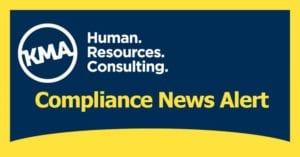 From the pros at the HR Support Center
From the pros at the HR Support Center
Minimum Wage
Beginning January 30, 2022, the minimum wage for work performed on or in connection with covered federal contracts will increase to $15.00 per hour. The minimum base wage for covered tipped employees will be $10.50 per hour.
A helpful FAQ can be found here.
80/20 Tip Credit Rule Restored
The Department of Labor’s (DOL) tip rule has been in limbo for the last year, but as of December 28, 2021, a new rule is in effect. This rule only applies in states where tip credits are allowed. In the rule, the DOL makes it clear that an employer may only take a tip credit when its tipped employees perform work that is part of the employee’s tipped occupation. Work that is part of the tipped occupation includes work that produces tips as well as work that directly supports tip-producing work, provided that the directly supporting work is not performed for a substantial amount of time.
The DOL gives some useful examples of work that would be considered part of the employee’s tipped occupation and work that would not be considered part of their tipped occupation.
- A server providing table service, such as taking orders, making recommendations, and serving food and drink — YES. That server preparing food, including salads, and cleaning the kitchen or bathrooms — NO.
- A bartender making and serving drinks, talking to customers at the bar and, if the bar includes food service, serving food to customers — YES. That bartender cleaning the dining room or bathroom — NO.
- A nail technician performing manicures and pedicures and assisting the patron to select the type of service — YES. That nail tech ordering supplies for the salon — NO.
- A busser assisting servers with their tip-producing work for customers, such as table service, including filling water glasses, clearing dishes from tables, fetching and delivering items to and from tables, and bussing tables, including changing linens and setting tables — YES. That busser cleaning the kitchen or bathrooms — NO.
- A parking attendant parking and retrieving cars and moving cars to retrieve a car at the request of customer — YES. That parking attendant servicing vehicles — NO.
- A hotel housekeeper cleaning hotel rooms — YES. That housekeeper cleaning non-residential parts of a hotel, such as the exercise room, restaurant, and meeting rooms — NO.
- A hotel bellhop assisting customers with their luggage — YES. That bellhop retrieving room service trays from guest rooms — NO.
In addition to work that produces tips (like the YES examples above), employees often perform work that is directly supporting their tip-producing work. For example, a server’s directly supporting work includes dining room prep, such as refilling salt and pepper shakers and ketchup bottles, rolling silverware, folding napkins, sweeping or vacuuming under tables in the dining area, and setting and bussing tables. Employers can take a tip credit when employee are doing directly supporting work up to a limit — once an employee spends a substantial amount of time on directly supporting work, the DOL considers them to be no longer engaged in their tipped occupation.
A substantial amount of time is defined as more than either 20% of the employee’s hours worked in a workweek while the employer is taking a tip credit or 30 continuous minutes. Once an employee has done directly supporting work for a substantial amount of time, the employer must stop taking a tip credit until the employee resumes clearly tip-producing activities.
Work that does not directly support their tip-producing work (such as the “NO” examples above) must always be paid without a tip credit.
You can read the rule and a lengthy explanation of how the DOL arrived where it did here. To find examples of how to calculate the amount of time that can be spent on directly supporting work while still applying a tip credit, search the linked document (the rule) for “5 hours.”
